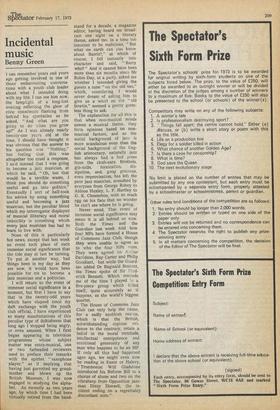Incidental music
Benny Green
I can remember years and years ago getting involved in one of those embarrassing conversations with a youth club leader about what I intended doing with my life. I can see him now, the lamplight of a long-lost evening reflecting the glow of civic conscience flashing from behind his spectacles as he asked, "And what are you gong to do when you grow up?" As I was already nearly twenty-one years old at the time, I should have thought it was obvious that the answer to his question was " Northing," but feeling that this was altogether too cruel a response, I said instead that I was going to become a jazz musician, at which he said, "Oh, but that would be a terrible waste. I think you should do something useful and go into politics." Eventually I sort of half-took his advice by soing something useful and becoming a jazz musician, but the peculiar blend which my interrogator displayed of musical illiteracy and moral imbecility is something which every jazz musician has had to learn to live with.
None of this is particularly hot news, except that last week an event took place of such immense social significance that the tide may at last be turning. To put at another way, had things been in my day as they are now, it would have been possible for me to become a jazz musician and a politician.
I will return to the event of immense social significance in a moment, but first I have to say that in the twenty-odd years which have elapsed since my daft exchange with the youth club official, I have experienced so many manifestations of this peculiar type of doltishness that long ago I stopped being angry, or even amused. When I first began appearing in television programmes whose subject matter was extra-musical, one or two •fatheaded reviewers used to preface their remarks with the epithet "saxophone player," as if implying that having just garrotted my grandmother and blown up the British Museum, I was now engaged in studying the alphabet. As recently as two years ago, by which time I had been virtually retired from the band stand for a decade, a magazine editor, having heard me broadcast one night on a literary theme, asked me, in a tone too innocent to be malicious, "But what on earth can you know about Barrie?," at which of course, I fell instantly into character and said, "Barry who?" And it cannot have been more than six months since Mr Robin Day, at a party, asked me whether I intended giving the guests a tune "on the old sax," which, considering I would never dream of asking him to give us a whirl on the "old bowtie," seemed a pretty gormless thing to ask.
The explanation for all this is that when non-musical minds assess a musical theme, they form opinions based on nonmusical factors, and as the social background of jazz is more scandalous even than the social background of the English aristocracy, naturally jazz has always had a bad press from the cloth-ears. Brothels, gin-mills, fornication, dissipation, and, good gracious, even improvisation, has left the poor jazz musician, assaulted by everyone from George Robey to Aldous Huxley, L. P. Hartley to G. K. Chesterton, with so much egg on his face that no wonder he can't see where he is going.
Never mind. That event of immense social significance may mean it is all behind us now. Both the Times and the Guardian last week told how four MPs have formed a House of Commons Jazz Club, though they were unable to agree as to who the four MPs They were agreed on A iur Davidson, Ray Carter and Philip Goodhart, but while the Guardian added Dr Reginald Bennett, the Times spoke of Sir Fr3derick Bennett. Which reminds me of the time I played '11 a five-piece group which b:lled itself, quite accurately as it happens, as the world's biggest quartet.
The House of Commons Jazz Club can only help the cause, for a sadly snobbish reason, which is that the British, notwithstanding copious evidence to the contrary, retain a belief in the moral rectitude, intellectual omnipotence and emotional generosity of any man who happens to be an MP.
If only all this had happened ages ago, we might even now be reading in Ensor or Halevy, "Trombonist Will Gladstone introduced his Reform Bill to a chorus of abuse and two on the vibraharp from Opposition jazzman Dizzy Disraeli, the incident ending on a regrettably discordant note."
































 Previous page
Previous page